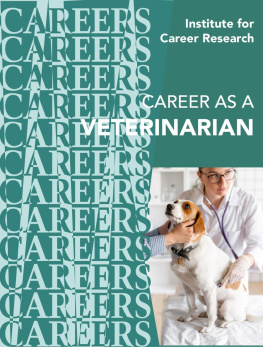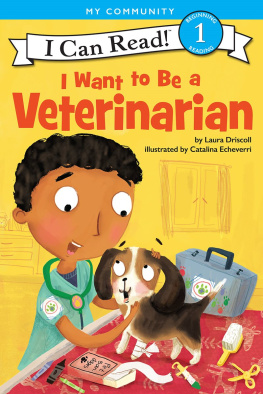
YOUR LOVE OF ANIMALS CAN PROVIDE A REWARDING LIFETIME PROFESSIONAL HEALTHCARE CAREER
Earnings
- Median Annual Salary: $95k +additional commissions, bonuses & profit sharing.
- High Earning Specialists: $200-300k/year
Personal Qualifications
- Animal lover
- Patient & observant
- Communication skills
- Interpersonal skills
- Aptitude & interest in science & math
- Lifelong interest in scientific learning
- Willingness to keep up with changes & advancements in technology & techniques
- Physically & mentally strong & healthy
- Emotional stability & the ability to deal with stress
The Work You Will Do
- Diagnose animal health problems
- Vaccinate against diseases
- Prescribe & administer medications
- Treat & dress wounds
- Set broken bones
- Hygiene services such as flea dips & shots
- Perform surgery
- Spay and neuter
- Routine checkups
- Advise pet owners
- Perform euthanasia

- Doctor of Veterinary Medicine degree
- Pass the North American Veterinary Licensing Exam (NAVLE)
- Pass the Clinical Competency Test (CCT)
Pluses
- Veterinarian helps improve quality of life not only for the animals, but the people who love them as well
- Work in clean & pleasant surroundings
- Modern facilities
- Treats a wide variety of animals
- Stable employment
- Opportunities for career advancement
- Good earnings
Minuses
- Veterinary medicine college admissions are very competitive
- May have to spend a lot of time outdoors, exposed to all kinds of weather
- Some risk dealing with animals
- Can be hard emotionally
- The career can be demanding
- Continually invest in new facilities, equipment & medicines
Introduction
Veterinarians are doctors who provide healthcare for animals. Like all doctors, they diagnose, treat, and research a wide variety of medical conditions using advanced procedures and sophisticated medical equipment. Their patients are often household pets, but they can also be livestock, zoo and aquarium dwellers, wildlife, or any other non-human animals.
Preventing disease and healing animals that are sick or injured are at the heart of what veterinarians do. The work is varied and activities go well beyond vaccinations, sutures, setting fractured bones, and surgeries. For example, veterinarians are responsible for identifying and combating infectious diseases that can be passed from animals to humans. Their work may also involve biomedical research, education, public health policies, food safety regulations, and environmental protection.
Eight out of 10 veterinarians are private practitioners, working in a one-person office or as part of a team in a clinic or hospital. These vets treat small animals, mostly pets and other companion animals. Most are generalists, providing a wide range of services from spaying and neutering to dental work and surgeries. They can also be highly-trained specialists that focus on particular medical conditions like diabetes or glaucoma, or specific functions such as orthopedic surgery or oncology.
Some vets travel to farms and ranches to work with large animals while others work with exotic animals in zoos and aquariums. Still others work in national parks and other natural habitats. There are also veterinarians who do not work directly with animals. For example, they may work on public health issues in government offices or conduct research in well-equipped laboratories.
Becoming a veterinarian is a lengthy process that takes at least eight years following high school graduation. To legally practice veterinary medicine, individuals are required to have a Doctor of Veterinary Medicine degree from an accredited veterinary college, as well as a state license. Vets who want to become board certified specialists will need to spend a few more years working in a clinical residency. When training is complete, the prospects of a new veterinarian finding employment are excellent. The demand for qualified veterinarians has never been stronger, especially for those with specialized skills.
Most vets report that their profession is quite rewarding. The pay is good with an average salary in the six figure range, and the opportunities are diverse and exciting. It can be challenging to deal with frightened animals who are sick or injured. It is sometimes equally difficult to interact with their owners who are also worried and stressed about their animals. For those with a passion for animals and great interpersonal skills, a career in veterinary medicine is an excellent career worth consideration.
What You Can Do Now
It is never too early to start preparing for a career as a veterinarian. Even a young teen in middle school can get a leg up by taking as many math and science classes as are available. A solid background in these subject areas will open up opportunities for college and beyond.
In high school, continue planning your curriculum around your future goals. Veterinary school admissions officers recommend a course load consisting of:
Four years of math (calculus, algebra, geometry, & trigonometry)
Four years of lab science (physics, biology, and chemistry)
Four years of English
Getting into veterinary school is not easy. To be competitive, you will need to study hard and maintain a high GPA, and score high on SAT/ACT exams.
Extracurricular activities are important, too. Take part in after-school athletics, clubs, and groups that involve animals like 4-H and Future Farmers of America (FFA).
Because it takes years of rigorous training to become a veterinarian, you will want to make sure this is a good fit before you start down the path in this field. Find out what the work is really like by talking with real veterinarians. Most are happy to share stories of their own experiences, from what they did in high school up until they became established professionals. Be prepared to ask plenty of questions and get advice on how to best prepare. You can find vets to talk to simply by calling local veterinary offices or asking your guidance counselor to help you arrange a job shadow (or two).
Look for summer veterinary camps or other animal-centered programs for teens. These are often offered by colleges of veterinary medicine, but there are independent programs as well. For example, Global Leadership Adventures (GLA) provides international experiences that are similar to the usual vet camps, but are situated in other areas of the world. You might work on conservation efforts for elephants in Thailand or help improve the habitat for sea turtles in Costa Rica. Any enrichment activity you can add to your rsum will make your vet school application stand out.
Get as much experience with animals as possible. Get a part-time job, such as dog walking, pet sitting, dog grooming, cleaning horse stalls, working in a pet store, or helping out in a vets office. If you cannot find a paying job, consider volunteering. Your local humane society or animal shelter can always use extra help. Local veterinarians, animal hospitals, and farms are other good possibilities for volunteer opportunities.
History of the Profession
Veterinary medicine in ancient history followed a path similar to that of human medicine. Animals became domesticated around 8000 BC throughout the Middle East. Their importance in human life quickly grew as they became a primary food source. In the domestication process, disease ran rampant, and herdsmen had to care for the sick and keep the herds healthy. Their attempts at cures were primitive to say the least, consisting of magic, incantations, and other barbarous rituals. Knowledge of animal anatomy and diseases remained extremely limited for several thousand years.
Next page













